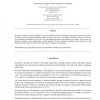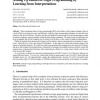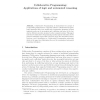934 search results - page 48 / 187 » Elementary Sets of Logic Programs |
91
Voted
NMELP
1994
15 years 2 months ago
1994
In Prz91], Przymusinski introduced the partial (or 3-valued) stable model semantics which extends the (2-valued) stable model semantics dened originally by Gelfond and Lifschitz G...
95
Voted
ASP
2003
Springer
15 years 3 months ago
2003
Springer
Abstract. Ordered Choice Logic Programming (OCLP) allows for preferencebased decision-making with multiple alternatives and without the burden of any form of negation. This complet...
LPNMR
2004
Springer
15 years 3 months ago
2004
Springer
This paper develops a declarative language, P-log, that combines logical and probabilistic arguments in its reasoning. Answer Set Prolog is used as the logical foundation, while c...
101
click to vote
CORR
2000
Springer
14 years 10 months ago
2000
Springer
When comparing inductive logic programming (ILP) and attribute-value learning techniques, there is a trade-off between expressive power and efficiency. Inductive logic programming ...
81
Voted
CADE
2008
Springer
15 years 10 months ago
2008
Springer
Collaborative Programming is characterized by groups of people issuing instructions to computer systems. Collaborative Programming languages differ from traditional programming lan...



